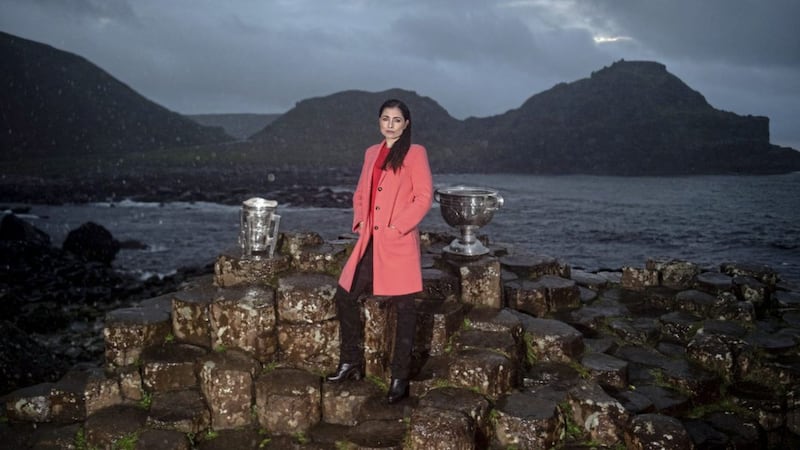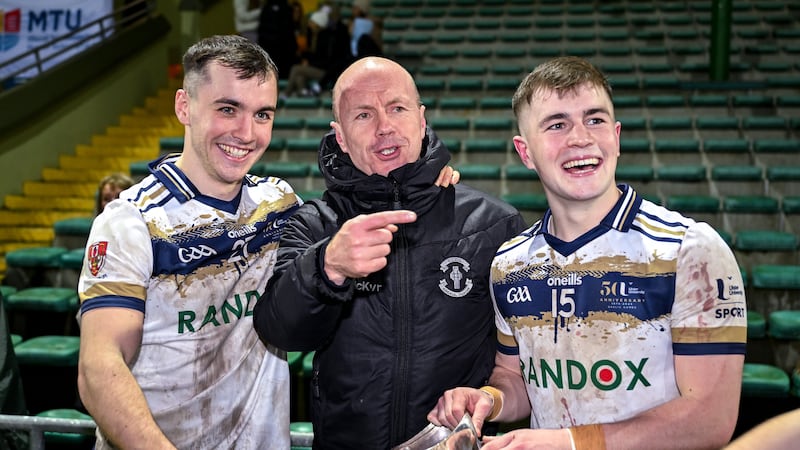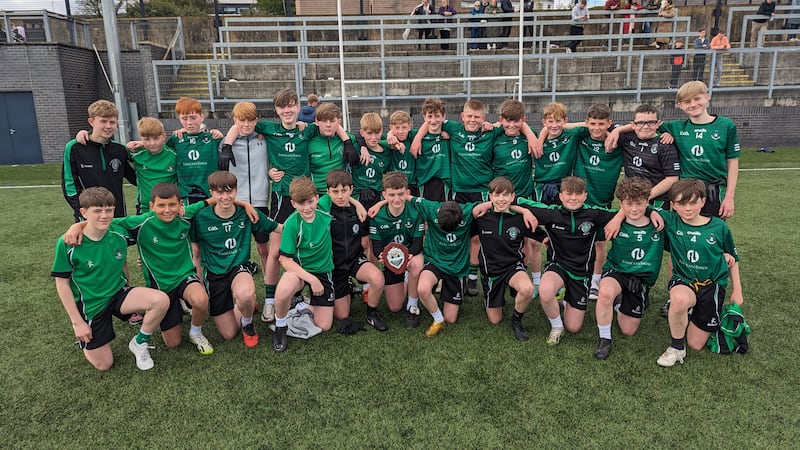WEDNESDAY afternoon in Blanchardstown and the summer’s end is nearing. Grey clouds hover over Junction 6 shopping centre without the menace they’ll carry in a few weeks.
The All-Ireland will be over by then. Whatever craziness Mayo and Tyrone bring to Croke Park, it will do well to engage the watching eyes of the nation as last weekend’s semi-final did.
For Joanne Cantwell, the woman cast in the role of chairing the national debate, this is the calm between the storms.
Four days earlier, it had been Pat v Sean.
Many viewed the full-out argument between the two former playing legends as TV gold. Some decried the lack of neutrality on the panel. Others thought the days of grown men trying to out-shout other had been discarded, replaced by a more sedentary style of TV.
When the RTÉ panel had their pre-match production meeting before the game, the fireworks were kept pocketed.
“I said I’d bring it [the delay] up, maybe mention Kerry’s statement, and asked what they thought. Sean said: ‘It sounds like Kerry are just looking for a warm-up match on the way to the All-Ireland final’.
“Pat said ‘yeah, we’ll talk about that, Tyrone played it beautifully, that’s fine’. That was it. It was a complete surprise what happened.”
That has not been The Sunday Game’s way of recent years.
This is Cantwell’s third season in the chair since replacing 35-year anchor Michael Lyster. There hasn’t been an afternoon to match it in her time.
“I actually really enjoyed it,” she smiles.
“We got a huge mix of some really good analysis, we got some absolute mayhem, we got some realness in the scrap that you’re talking about between Sean and Pat.
“I think it was a reflection of what’s going on [in society]. We’re all driven mad this last couple of years, so many different things happening and we’re trying not to get angry at things. To me, it was like two people just finally let go.
“People would say they shouldn’t do this or that, but they were just being real.”
For four minutes they hopped off each other with the same rawness that would follow down on the turf.
The host briefly interjected three times – once to tell Sean to let Pat finish his point, once to tell Spillane to let Cavanagh answer the questions, and the third to correct a slight misnomer thrown in by the Kerry man.
Some would say she buts in too often. Others view her style of presenting as bringing greater accuracy.
As one colleague put it: ‘She doesn’t stand for any bullshit. She’ll pull you if you’re wrong and that makes you up your game.’
It is undeniably different from when Lyster was in the chair. With Brolly, Spillane, O’Rourke, Loughnane, chaos could unfold at any given minute.
“I’m not aiming to be anything. One of your greatest flaws could be basing the decisions you make on air on the hope people will think you are something. Talking about Twitter, it can be really dangerous if you look at the pile-ons and what they’re saying, and it gets into the back of your head that you must prove them wrong.
“That shouldn’t be the reason you’re making a decision. I’d rather not think about it and let people say what they want to say. As long as I do what I believe is right and try my best.
“God, I sound like Joe Schmidt!”
* * * * * * * * * * * * * *
GAELIC football was always Joanne’s thing.
Her first job was as a gymnastics coach in the club run by her father in Coolmines Sports Complex. Her mother, whose childhood was spent in New York, and four sisters have only a passing interest in the GAA.
Joanne was the one who marched up to her Year Head at school and asked why there was no soccer team for the girls when the boys had one. By the start of the following week, the balance was redressed.
She played soccer, played basketball, did gymnastics. But it was always football.
At 16, she was called into the Dublin ladies’ panel. In 1997, they won the county’s first ever game in the Leinster championship. A year later, she won an Allstar at full-back.
Those were the green shoots of what we see today, a team that fell just short of five All-Irelands in-a-row at the weekend.
Cantwell left just as Mick Bohan took over for the first time. Having thought long and hard, she settled on the decision that going back and trying to juggle it all would be insanity.
Her sporting prowess earned her one of the first GAA scholarships at DCU, which she used to take on journalism.
Her paternal grandfather, Jim, had been a crime reporter with the Dublin Evening Mail and then the Evening Herald.
Football had been everything but unless it could be that, it had to be nothing. Work took over. In time, daughters Emmy (10) and Alex (8) would come along too. County football got knocked on the head.
She’s spoken in the past about regretting quitting so early but trying to do it all was never going to fly anyway.
“I think I have a single-mindedness that isn’t necessarily a good thing. When it was Dublin, there was nothing I wouldn’t do for that team. And then when it became career, there was nothing I wouldn’t do to be the best that I could.”
In a world where she’s surrounded by multiple All-Ireland winners, Hurlers of the Year, Olympic athletes and generational sporting stars, she played football to a standard that allows her to hold her own.
Playing it at all has become important to her of late. Doing goals for Celbridge as they won last year’s Kildare junior B championship was partly the enjoyment and partly the feeling that it’s easier to talk about a game you’re still playing.
Her team-mates are young and they’re different but they’re great. She was never the one to be in the real thick of the nights out anyway.
Cantwell once described herself as “a little anti-social”, a term that she’d rather revise now.
“I’m a little… Probably ‘not sociable’ is a better way to put it, not anti-social, because I love people, I love meeting people, and I love chatting to people. But I wouldn’t be a great one for going out very often.
“That’s just me. It’s just my personality. You asked about that Dublin team, one of my great memories is that I was the young one. You’d be coming back from wherever your match was and they’d pick up a few God-knows-what in the off licence.
“They’d be singing and roaring, I’d be loving it but I wouldn’t be in the heart of it. They’d check on me, make sure I’m ok, and I’d be loving it, but I’m just not the person in the middle of it, singing – but I’m loving the singing.”
It’s not shyness, because who could be that shy and yet that comfortable in front of a million people?
She never drank. Tried it, didn’t like it, and was happy with that.
Constant contact with her co-workers is not her style, but her friends are not sporty with the exception of one, a former Dublin team-mate who’s been in Manchester for years.
Does that social reticence equate to a feeling of having missed out?
“Erm… See, I do other stuff. I don’t miss out on… Do I feel like I miss out on it?” she muses, pursing her lips together.
“Every time I think I might miss out, I think ‘do I wanna sit there for hours on end?’ I don’t drink. It’s fun until people get very drunk. Sometimes, not always.”
Running is her thing now.
The first two weeks of the season, The Sunday Game panel were seated for live games rather than standing because Cantwell tore her calf muscle and couldn’t stand for long enough.
Celbridge began their junior championship campaign two weeks ago and their 42-year-old goalkeeper wasn’t able to play.
Her Dublin years were the footballing degree. This is the refresher course.
* * * * * * * * * * * * * *
"I got a warning. You couldn't make this stuff up. It said at 11 minutes past three on the day of the drawn All-Ireland Final you said to Pat Spillane, and it was put into quotes, 'Would you stop patting my arm?' [The warning said] 'this was grossly unprofessional and rude and cannot be tolerated'. I kid you not. I was also told that Joanne Cantwell had lost confidence in my abilities as an analyst."
Joe Brolly on the Ireland Unfiltered podcast, October 2019
AS host and pundit, Joanne Cantwell and Joe Brolly shared one summer six feet apart. By the end of it, Brolly’s career with RTÉ was six feet under.
2019 would be the Derry man’s last hurrah with the station. It was clear when he was dropped from the panel for the All-Ireland football final replay that his days were numbered. Turned out the number left was zero.
On their very first night, a League Sunday show at the end of January, the pair clashed. It was good-natured and smiling, but Joe had been used to having his own way with Michael Lyster. This was different.
“Are you going to argue with me over every single thing that I say, Joanne?”
“If it requires an argument, yes.”
“This is going to be an extremely long year.”
By the time Stephen Cluxton was making his annual, barely smiling trip up the Hogan Stand steps, Brolly had effectively exited stage left.
The podcast with Dion Fanning from which the above quote is taken was released a few weeks later. There was an unquestionable air of ‘who is she to lose confidence in me?’ about the way the words were spoken.
“That’s not true, by the way,” says Cantwell.
“I did actually see that. I was kind of taken aback when I saw it. That was quite early on and he was probably hurt, he was probably annoyed, so why shouldn’t he come out and say that? That’s fine. That’s what he does.
“He was a brilliant analyst, he absolutely was, and he gave years of absolute value. You won’t hear me say anything bad about him.
“And also, got on brilliantly with him. He drove me insane at times, but he did it on purpose.
“The show would be finished, we would maybe have had a big back-and-forth during it, I’d be away to get changed and he’d be typing furiously when I come back for his article for the next day, and he’d look up and say ‘loved the tension, loved it!” and I’d roar laughing. That would be that.
“He had more pointed digs at Declan [McBennett, Head of RTÉ Sport] and I felt for that, I felt for Declan.
“But Joe’s entitled to say what he wants, that’s who Joe is and that’s why he was brought in to do the job in the first place, and what made him so good at it.
“To turn around and say you’re annoyed at him for saying that would be a bit rich, wouldn’t it? So, no [I’m not annoyed].”
They haven’t encountered each other since but Joanne insists there will be no issue from her end when they inevitably do.
Neither party would be renowned for their backward steps.
Joanne Cantwell’s thirst is for accuracy from those tasked with informing the GAA public on Sunday afternoons. Opinions are fine; bringing misinformation to the table, not so much.
She would come to matches with two file jammed blocks of information on the game. Her 10 days leading into the All-Ireland final will have consisted of “reading every article under the sun” and rewatching games, because even though it’s the analysts’ job, she can’t keep the conversation between the hedges if she hasn’t her own homework done.
Is it fair to say that her journalistic background remains to the fore, in the way that she stays on top of the debate?
“Yes and no. That’s both complimentary and insulting. The most important thing about broadcasting is that it shouldn’t be like an interview, it shouldn’t be like a journalistic piece as such.
“It should be that there’s a group of people and you’re there with them. But at the same time, I suppose my brain does work like that. I like to get the absolute most out of everything and everyone. Maybe that’s what it is.”
Having gone through DCU, she stepped straight into the sports department in FM104 in 1999 before moving to TV3 and then on to RTÉ.
The first female host of RTÉ’s Champions League coverage, she also chaired the rugby show Against The Head, as well as reporting on The Premiership, the station’s Saturday evening highlight show that allowed a generation to watch the football twice in one day.
But it’s always, always been about The Sunday Game. Part of her misses the sideline gig, the meeting players and forming relationships.
“I think it’s important that you recognise them as people. Sometimes when you’re there discussing someone, he or she becomes a thing rather than a person,” she concedes.
No matter what she or anyone else does, there will always be people out there who will deem her inadequate because she’s a woman. That’s just how society is.
When Michael Lyster departed The Sunday Game chair, RTÉ appointed from inside. Three of the four candidates on the shortlist were women.
Cantwell is not a prolific social media user. Her tweets are usually an hour before the game begins, to remind viewers of who’s on the panel. She doesn’t engage, doesn’t reply, but she does read it.
Recently, she made “a stupid, off-hand remark”, in her own words, about Cora Staunton wearing her Mayo hat when she strongly criticised referee Conor Lane at the end of normal time in the epic Mayo-Dublin semi-final.
“You get a sense if there’s a pile-on and I’ll leave it a few days.”
That’s not to be confused for any undue sensitivity to criticism. She insists she doesn’t see any misogyny and sexism thrown her way, but knows from others that it does exist.
Yet she is less conscious of being a woman in a man’s world than she is of not recognising the difference between criticism and sexism.
“There’s a fine line between some men being accused of sexism when actually they’re allowed to not like someone, even if they’re female, without it being because she’s female.
“And there are some other people who out-and-out are sexist, and I wouldn’t be bothered with them.
“Some people would claim that sexism isn’t a problem out there when it quite clearly is. I’m just really conscious of when you claim something is sexist when it’s not necessarily, it lessens the true sexism. I’m very, very conscious of not doing that.”
RTÉ are like the majority of broadcasters now, trying to redress the balance. The majority of their big-game panels will have a female pundit. It still feels new. To some, it will feel wrong. That’s on them.
While outright rejecting that the presence of female contributors on RTÉ’s panels is anything related to gender quotas or in any way tokenistic, Cantwell still sees that as a necessary evil for life in general.
“The argument against gender quotas are ‘let’s let it happen naturally’ and ‘have the best people there’. We’ve been trying for how many thousands of years to let it happen naturally and it hasn’t happened, so we need to accept that it needs a little bit of a push.
“The argument that it should be the best people suggests that men must just always be the best, because it’s always men, regardless of what the role is. That’s in life, in general, and I’m not accepting that either.
“It won’t be the current kids, but so that in 20 years, it’s totally normal, whether it’s a girl or boy. People say they want their little girl turning on the telly and seeing it, but they should also want their little boy turning on the TV and seeing Cora Staunton or Ursula Jacob or whoever – that it’s just normal.”
And off she goes, back beneath the grey clouds, not knowing what Saturday will bring.
Come what may, Joanne Cantwell will hold her own.








